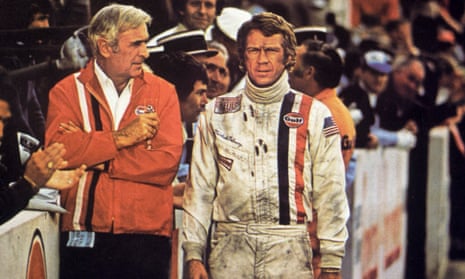For a film that started life without a script, and never managed to acquire much of one along the way, Le Mans gave Steve McQueen one of the best lines of his career. “When you’re racing … it’s life,” he says to the girlfriend of a rival racing driver. “Everything else is just waiting.”
It’s such a good line that it makes you think McQueen must have borrowed it from real life, just as the writer of John Frankenheimer’s film Grand Prix appropriated the former world champion Phil Hill’s striking claim that he always put his foot down harder on the accelerator when he passed the scene of an accident on the track because he knew everyone else would be lifting theirs.
Grand Prix was made in 1966, four years before Le Mans, and it had the benefit of a mostly excellent script by Robert Alan Aurthur. Just as Michael Mann’s Heat was a film about three separate man-woman relationships masquerading as a heist movie, so the core of Frankenheimer’s film was not the lavish racetrack footage but the interaction between Yves Montand and Eve Marie Saint, James Garner and Jessica Walter, and Françoise Hardy and Antonio Sabato. Le Mans, by contrast, was a film about the relationship between McQueen and fast cars.
At the very moment when he was acclaimed as Hollywood’s most bankable male star, McQueen wanted to be something else. He wanted to be a racing driver. And when, after the success of Bullitt and The Thomas Crown Affair, he was given $6m to make any film he wanted, he saw the possibility of uniting his day job and his obsession. In 1970, at the height of his fame, the film he most wanted to make was about the 24-hour race at Le Mans.
In his mind, he simply wanted to make cinema audiences feel what he felt. He loved speed. When he appeared to jump his motorcycle over the barbed-wire fence in The Great Escape, the stuntman involved was expressing McQueen’s own instincts as much as those of the character he played. While he was preparing to make his motor racing film, he finished second in the Sebring 12-hour race, co-driving a Porsche with Peter Revson, the heir to the Revlon cosmetics fortune.
McQueen was not alone in falling for the unique charisma of Le Mans, and a feature film making more imaginative use of that historic setting, with its all-night funfair and bleary dawn, might have stood a chance. In 1970, too, the circuit still featured the epic Mulsanne straight, six kilometres of public highway uninterrupted by the chicanes later introduced to minimise the element of danger.
But his priorities proved to be lethal for the film’s fortunes. He arrived at Le Mans to shoot footage during the actual race that June (his insurance company squashed his plan to take part, co-driving a Porsche with Jackie Stewart) and then stayed on with his vast crew, a bunch of genuine Ferrari 512s, Porsche 917s and Lola T70s, and a gaggle of real-life racing drivers, including the Le Mans winners Derek Bell and Dickie Attwood. But no script.
“I don’t think there’s any racing driver who could tell you why he races,” he said. “But he could probably show you.” That became a guiding principle. The more banal human emotions would have no place in this film. Presented with sufficient authenticity, the public could not fail to be won over. Or so he felt.
As executive producer, McQueen was running the show. To direct the film he hired John Sturges, a distinguished veteran with whom he had worked on The Magnificent Seven and The Great Escape. “We’ve done two films together and we’ve had nothing but fun,” Sturges told an interviewer on his arrival in France. That would change. Soon tiring of the reversal in the balance of power, and wanting to make a proper film, the director walked away.
As they received reports of their investment going up in exhaust smoke, the men in Hollywood began to panic. By that time McQueen had several scriptwriters working in adjacent caravans at the circuit, each trying to cobble together a semblance of a story. “We don’t care which script you make,” the money men told McQueen. “Just make one of them.” They brought in a hack director, Lee Katzin, and McQueen’s executive status was removed. That didn’t stop him trying to boss the newcomer around. When Katzin requested one more take, the actor responded: “Listen, asshole, I’ll tell you when there’s one more.”
Eventually the picture got finished, three months after the scheduled August date for completion. It was so late that, in order to match sequences shot earlier, they were having to paint the dead leaves green. The production also ran £1.5m over budget: not much now in Hollywood terms, but a fortune back then. The last-ditch attempts to insert elements of humanity into the racing drama were mostly fruitless, and the film was a box-office disaster.
The whole story is compellingly told in Steve McQueen: The Man and Le Mans, a 100-minute documentary released in cinemas this weekend. Made with the co-operation of the woman who was his wife at the time, Neile Adams, and their son, Chad McQueen, it does not entirely airbrush away the personality flaws that made McQueen such a tricky customer beneath that fast-twitch combination of masculinity and sensitivity and that sudden blinding grin.
He could pick the wrong fights. “If I have my name out there,” he says in one of the previously unheard audio tapes used in the documentary, “they can no longer palm me off as a candy-ass movie star. They have to deal with me.” But in the struggle for creative control, there could be only one winner.
“He was nothing but success up to the point of Le Mans,” his personal assistant says. “Everything turned to gold. With Le Mans, everything turned to shit.” The film’s failure ended McQueen’s dream of controlling his artistic destiny, and the zest for fast driving seemed to disappear with it.
“Steve was Icarus,” another of his associates says. “He wanted to fly so high, and he didn’t quite understand the point at which the wax starts to leave your wings.”
In 1980, aged 50, he died of lung cancer. What he left us, this actor whose silences usually spoke louder than his words, is a film that doesn’t tell us much about the human condition but does, at the very least, show what it was like to race some of the most formidable racing cars ever built. Which, in the end, was all he was after.

